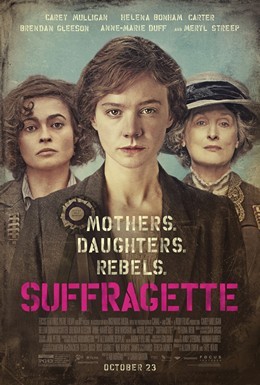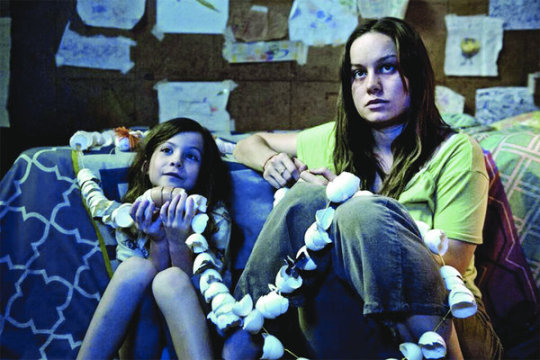Women Film Critics Circle Award Winners 2015
The winners are in for our 10th Annual WFCC awards. Congratulations to all!
The Women Film Critics Circle is an association of sixty-five
women film critics and scholars from around the country and
internationally, who are involved in print, radio, online and TV
broadcast media. We came together in 2004 to form the first women
critics organization in the United States, in the belief that women’s
perspectives and voices in film criticism need to be recognized fully.

BEST MOVIE ABOUT WOMEN
Suffragette
BEST MOVIE BY A WOMAN
Suffragette
BEST WOMAN STORYTELLER [Screenwriting Award]
Carol: Phyllis Nagy
BEST ACTRESS
Carey Mulligan: Suffragette
BEST ACTOR
Eddie Redmayne: The Danish Girl
BEST YOUNG ACTRESS
Brie Larson: Room

BEST COMEDIC ACTRESS
Amy Schumer: Trainwreck
BEST FOREIGN FILM BY OR ABOUT WOMEN
The Second Mother
BEST FEMALE IMAGES IN A MOVIE
Suffragette
WORST FEMALE IMAGES IN A MOVIE
Jurassic World
BEST MALE IMAGES IN A MOVIE
Bridge Of Spies
WORST MALE IMAGES IN A MOVIE
Steve Jobs
BEST DOCUMENTARY BY OR ABOUT WOMEN
Amy
BEST SCREEN COUPLE
TIE:
45 Years: Charlotte Rampling and Tom Courtenay
Room: Brie Larson and Jason Tremblay
BEST THEATRICALLY UNRELEASED MOVIE BY OR ABOUT WOMEN
Bessie
BEST EQUALITY OF THE SEXES
TIE: Mad Max, Fury
BEST ANIMATED FEMALE
Joy, Amy Poehler: Inside Out
BEST FAMILY FILM
Inside Out
WOMEN’S WORK/BEST ENSEMBLE
Suffragette
*SPECIAL MENTION AWARDS*
COURAGE IN
FILMMAKING
Sarah Gavron: Suffragette
*ADRIENNE SHELLY AWARD: A film that most passionately opposes violence against women
He Named Me Malala
*JOSEPHINE BAKER AWARD: For best expressing the woman of color experience in America
What Happened, Miss Simone?
*KAREN MORLEY AWARD: For best exemplifying a woman’s place in history or society, and a courageous search for identity
Suffragette
ACTING AND ACTIVISM AWARD
Olivia Wilde: For her work with Save The Children, ACLU, and
Artists For Peace. And her support for holistic organic causes needed
for the sustenance of every community.
LIFETIME ACHIEVEMENT AWARD:
Lili Tomlin
COURAGE IN ACTING: [Taking on unconventional roles that radically redefine the images of women on screen]
Brie Larson: Room
BEST FEMALE ACTION STAR
Charlize Theron, Mad Max: Fury Road
THE INVISIBLE WOMAN AWARD: [Performance by a woman
whose exceptional impact on the film dramatically, socially or
historically, has been ignored]
Alicia Vikander; The Danish Girl
MOMMIE DEAREST WORST SCREEN MOM OF THE YEAR AWARD:
Cate Blanchett: Cinderella
**ADRIENNE SHELLY AWARD: Adrienne Shelly was a promising actress and
filmmaker who was brutally strangled in her apartment in 2006 at the age
of forty by a construction worker in the building, after she complained
about noise. Her killer tried to cover up his crime by hanging her from
a shower rack in her bathroom, to make it look like a suicide. He
later confessed that he was having a “bad day.” Shelly, who left behind a
baby daughter, had just completed her film Waitress, which she also
starred in, and which was honored at Sundance after her death.
**JOSEPHINE BAKER AWARD: The daughter of a laundress and a musician,
Baker overcame being born black, female and poor, and marriage at age
fifteen, to become an internationally acclaimed legendary performer,
starring in the films Princess Tam Tam, Moulin Rouge and Zou Zou. She
also survived the race riots in East St. Louis, Illinois as a child, and
later expatriated to France to escape US racism. After participating
heroically in the underground French Resistance during WWII, Baker
returned to the US where she was a crusader for racial equality. Her
activism led to attacks against her by reporter Walter Winchell who
denounced her as a communist, leading her to wage a battle against him.
Baker was instrumental in ending segregation in many theaters and clubs,
where she refused to perform unless integration was implemented.
**KAREN MORLEY AWARD: Karen Morley was a promising Hollywood star in
the 1930s, in such films as Mata Hari and Our Daily Bread. She was
driven out of Hollywood for her leftist political convictions by the
Blacklist and for refusing to testify against other actors, while Robert
Taylor and Sterling Hayden were informants against her. And also for
daring to have a child and become a mother, unacceptable for female
stars in those days. Morley maintained her militant political activism
for the rest of her life, running for Lieutenant Governor on the
American Labor Party ticket in 1954. She passed away in 2003,
unrepentant to the end, at the age of 93.
CONTACT: Criticalwomen@gmail.com




